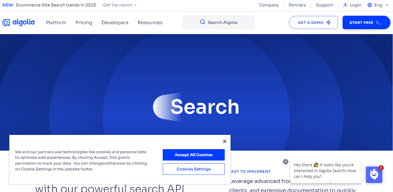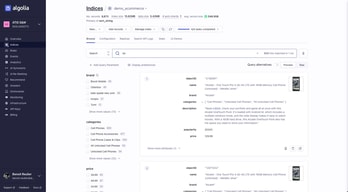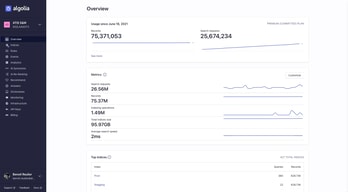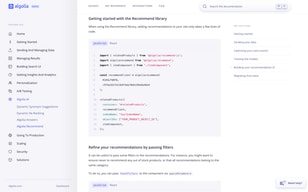

Unclaimed: Are are working at Algolia ?
Algolia Reviews & Product Details
Algolia is a discovery and search tool designed to help businesses improve their website and app search experience. The platform has tools such as instant search, typo tolerance, and personalized results that help users find the information needed efficiently. With a focus on simplicity and ease, Algolia helps businesses increase engagement and conversions by delivering a fast and relevant search experience.

| Capabilities |
AI
API
CLI
|
|---|---|
| Segment |
Small Business
Mid Market
Enterprise
|
| Deployment | Cloud / SaaS / Web-Based, Mobile Android, Mobile iPad, Mobile iPhone |
| Training | Documentation |
| Languages | English |







Setup & configuration was accomplished in an afternoon You get instant feedback / results No need to hire resources & spend time on infra to support lighting quick searches The extra analytics about what was searched on is also great
It requires some thought and/or additional dev work to work around how the pricing model is defined in operations (i.e. when we need to refresh the index data).
Algolia makes it dead-simple, quick and fun for our users to perform the mundane task of searching across the hundreds of thousands of athletes so that they can then get to the juicy part of checking out their race-performance analytics!
Search out of the box, just plug a few things here and there and you are done!
Pricing is a bit of a problem, especially, the jump from starter to pro is HUGE!
Even though I have used Algolia before in a variety of different ways, at the moment, most recently I used it to add search to a static website which hosts internal developer docs.
Algolia is so easy to use that it makes implementing enterprise search an absolute breeze. It offers us almost all of the benefits of elasticsearch, but in a turnkey solution.
Nothing, so far. Elasticsearch is more configurable but we find that we're happy with trading off some of that control for ease of implementation/administration.
We're dedicated to shipping low-latency solutions throughout our product suite, so Algolia's speed, combined with things like its typo-tolerance features, makes it very user-friendly.
I am not a developer, but my team had a pretty much hustle free time implementing the software and get it running in 2 different applications. As we are only a very small team, time to market is very critical. The WOW effect kicks in when you start the search and get the instant results in a matter of a blink. The true beauty unfolds as you can easily modify the search in the Admin Dashboard. So you don't have to bother your developers any more. The application is reasonable priced and I can not image how we would do without it. We had a custom build search implemented in our application but those are anything near of what Algolia is capable of. The user experience on http://www.solartraders.com for our customers is on another level now.
Maybe the could refine a bit the dependencies of the filters. Apart from it I don't have many recommendations as the experience is a fantastic one so far.
If you need search on your application, use Algolia! It is incredible fast and reliable and time to market for deployment is very fast. For a simple search without filters you are done in a couple of hours. For a search including filters (depending on complexity) calculate 2-4 days.
Not having to manage my own search infrastructure including software setups and performance
Having to manage duplicates / already indexed items in my own databases
Search suggestions, SERP Benefits are great user experience in terms of performance and result prioritisation. Internal benefits are we are saving hires to manage search infrastructure
Algolia is incredibly fast to execute searches, often results return in just a few milliseconds. Setup was quite easy, even given the technical overhead involved, since the API and docs are clear and to the point. It has out of the box compatibility with VueJS which I love, so that is appreciated. The default widgets provided are easy to customize and it's not too hard to make your own when needed. There are plugins for Wordpress and other CMSs for those that use them. I'd also counterpoint to anyone who mentions price as a negative. I would challenge anyone to show me they can even setup the raw infrastructure needed to run something like elastic search this fast, never mind the ongoing costs needed to maintain such a system. Algolia can't be beat from a value standpoint right now in this space.
The lack of date based filter widget maybe? I have no serious complaint against the product. Algolia has served all the needs I had for search.
We are a small team and deploying real-time faceted search on complex sites is very difficult. Then to do is reliably with cross-platform compatibility and great speed, that's nearly impossible. Algolia makes this process trivial by comparison, with a few custom plugins we are able to setup user friendly search on all of our sites easily.
The easy integration is the first thing attractive in Algolia, the comes the fast search the suggestion and other features
The bad side of Algolia is that we can not use it promise, we need to use it as a SaaS and this is a privacy for some of our clients
We tried to implement search our selves but it was really difficult, Algolia helped as a lot to implement search in our product
It's easy to use and plenty of SDKs are provided so there's is one for everyone. Setup and configuration are done through a clear dashboard which also offers great insights into search performance. Search results are being delivered instantaneously. They're so fast that using a search index for search query completion is working perfectly. The pricing is very reasonable. For testing and small volume sites, there is even a free tier. Support also is great. The turnaround for a fix in one of the provided SDKs was less than 24h.
There is nothing that I truly dislike about algolia.
It's saving us the effort to build our own search infrastructure. We have no relevant skills available in-house, so having such a service offered at a reasonable cost is helping is to get our products to the market a lot faster.
Super easy to setup, configure and make on-the-fly changes and has dramatically improved the search experience for our customers and staff trying to find products and articles on our website
Nothing to dislike. It's amazing! Nothing more I can add
The search logic that I personally developed was very basic, didn't understand plurals, spelling mistakes and was slow. Algolia has solved all of this.
The best thing about Alogolia is the ease of setting up and using. They have ready integrations with all major platforms. We were up and running with Algolia within minutes.
Sometimes there are outages without a prior notice and the whole website breaks if not handled.
Having more than 7000 products on our e-commerce store, the most critical feature is searchability of products and with Algolia this is effortless.